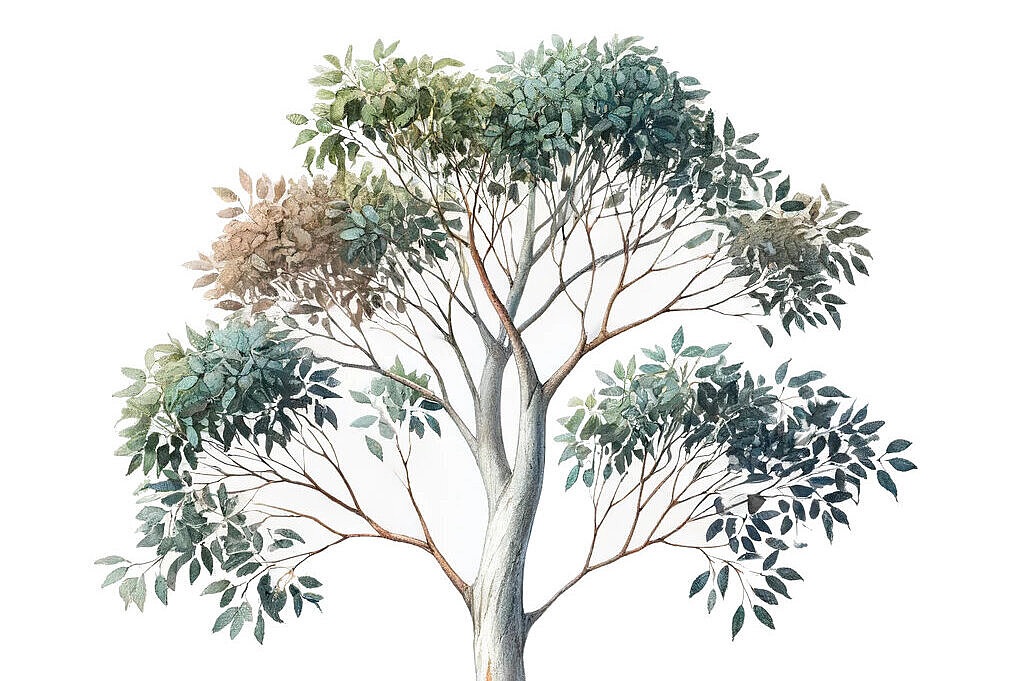Blue eucalyptus

Ingredients of blue eucalyptus: a double-edged sword
Blue eucalyptus (Eucalyptus globulus) is best known for its essential oils, which comprise a wide range of compounds. The main component is eucalyptol (also known as 1,8-cineole), which has antimicrobial and anti-inflammatory properties. In addition to eucalyptol, other terpenes, aldehydes and ketones are found in the leaves of eucalyptus, which together form a potent mix of chemical compounds that are valued in human medicine and aromatherapy. But what about the safety of these ingredients for dogs?
The effect on dogs: a reason for caution
Although the compounds in blue eucalyptus can have a variety of positive effects for humans, the picture is different when it comes to our dogs. Eucalyptol, the main component of the essential oil, is toxic to dogs in large quantities. Toxicity manifests itself in symptoms such as salivation, vomiting, diarrhea, weakness and, in the worst cases, impairment of the central nervous system. It is therefore of the utmost importance that products containing eucalyptus oil are kept away from dogs and the use of such oils in the vicinity of dogs should be done with the utmost caution.
Preventive measures: Safety first
To minimize the risk of poisoning, you should take the following preventive measures:
- Educate yourself: knowledge is power. Inform yourself about plants and substances that could be dangerous for your dog.
- Safe storage: Ensure that all products containing eucalyptus oil are kept out of your dog's reach.
- Use with caution: Avoid using eucalyptus oil near your dog, especially in the form of diffusers or sprays.
- Watch your dog: Watch for signs of intoxication, especially after a walk in areas where Blue Eucalyptus grows.
A respectful approach to nature protects your dog
The blue eucalyptus is a fascinating plant with many useful properties for humans. For our dogs, however, contact with this plant can be dangerous. By following the above preventative measures and always keeping a watchful eye on your four-legged friend, you can minimize the risk of eucalyptus poisoning. Your dog's health and well-being are in your hands. By handling plants and substances in your household responsibly, you can help ensure that your dog lives a long, healthy and happy life.
Properties 23
Are you looking for other ingredients with a specific property?
Just click on them to find more.
If you notice any signs of hypersensitivity or poisoning in your dog, you should see your vet immediately. We are not a substitute for a vet, but we try to be as accurate as possible. Every dog reacts differently and we recommend you get a second opinion or consult your vet if in doubt.
Stay healthy and take good care of your four-legged friend!😊
Similar to Blue eucalyptus
Eucalyptus leaves contain a variety of chemical compounds, among which eucalyptol (also known as 1,8-cineole) is the best known. This substance is responsible for the characteristic scent of...
Peppermint eucalyptus, a special type of eucalyptus, is known for its clear, fresh and slightly minty scent. This plant, originally from Australia, is valued worldwide for its essential oils, which...
The red eucalyptus (Eucalyptus camaldulensis) is a tree species that originated in Australia and is known for its robust nature and impressive height. Its name is derived from the striking red color...
The snow eucalyptus (Eucalyptus pauciflora) belongs to the extensive family of eucalyptus trees and is characterized by its ability to withstand low temperatures and even snow cover - a rare trait...



